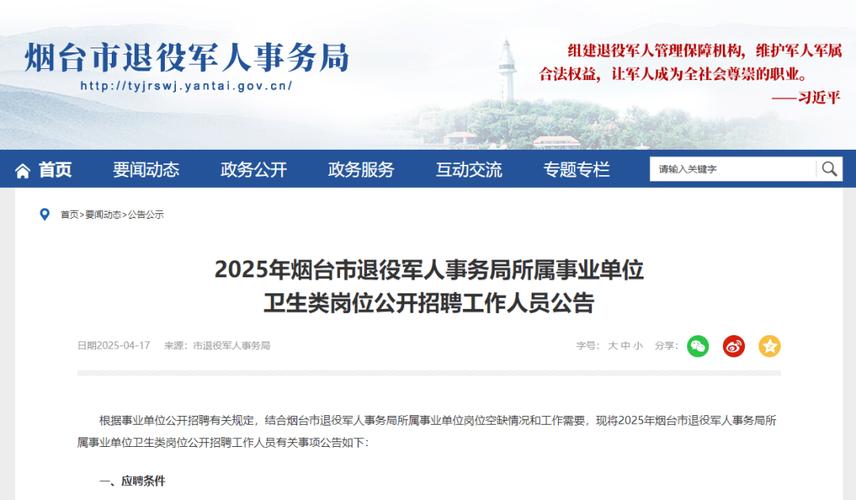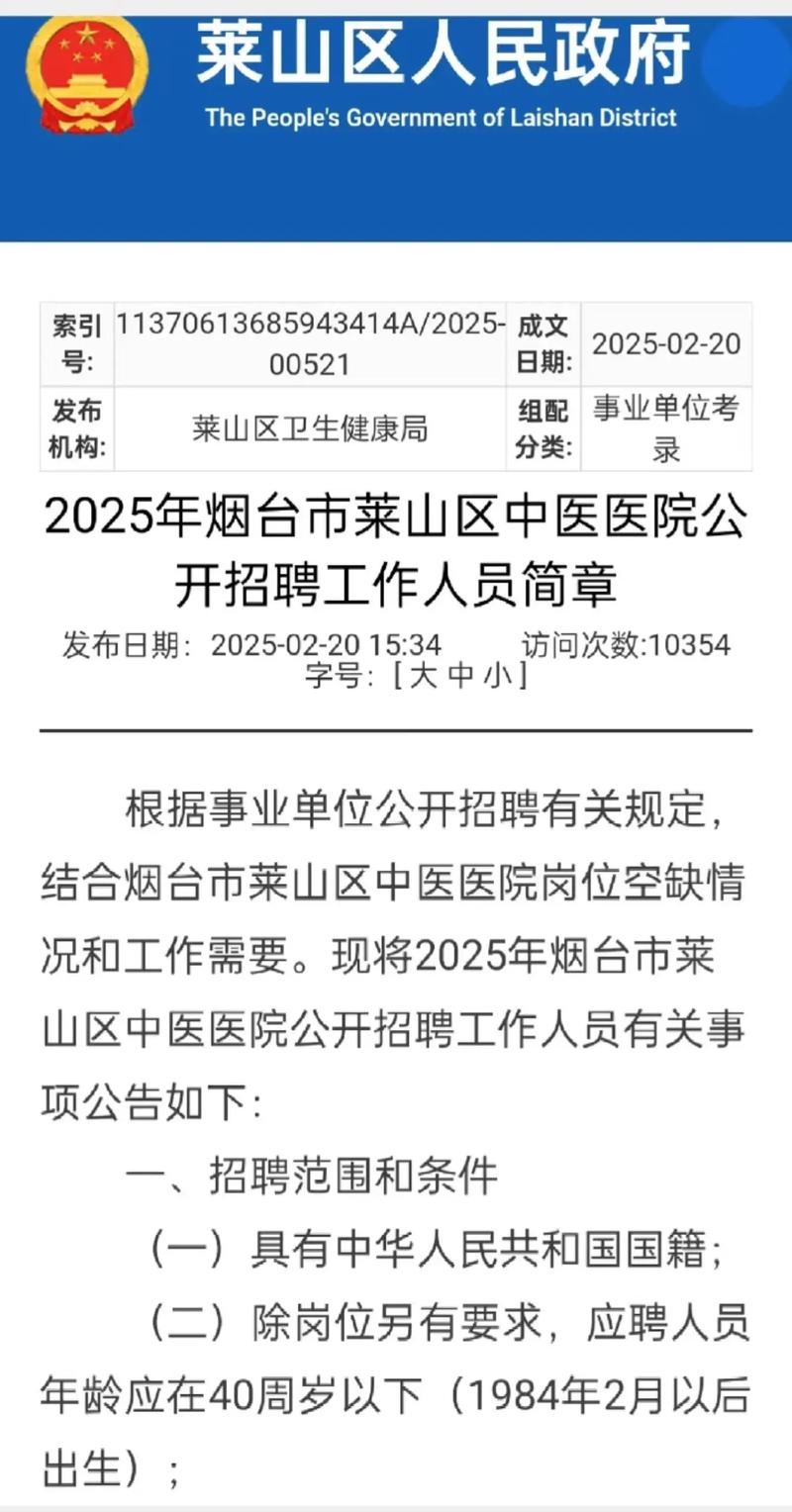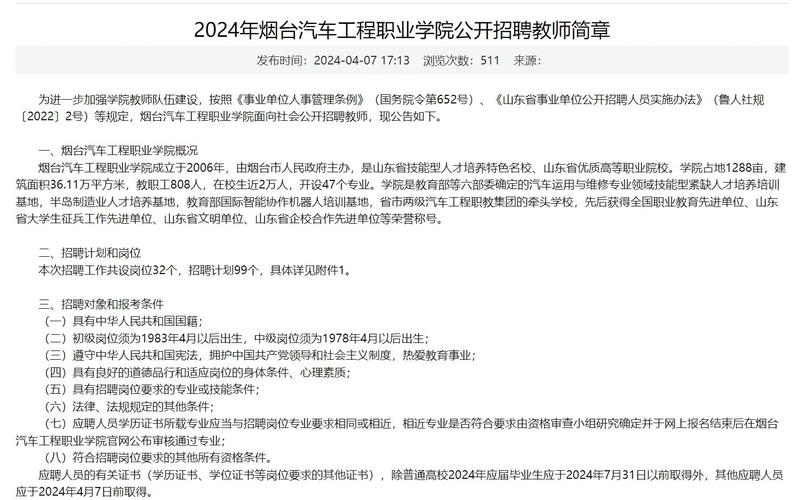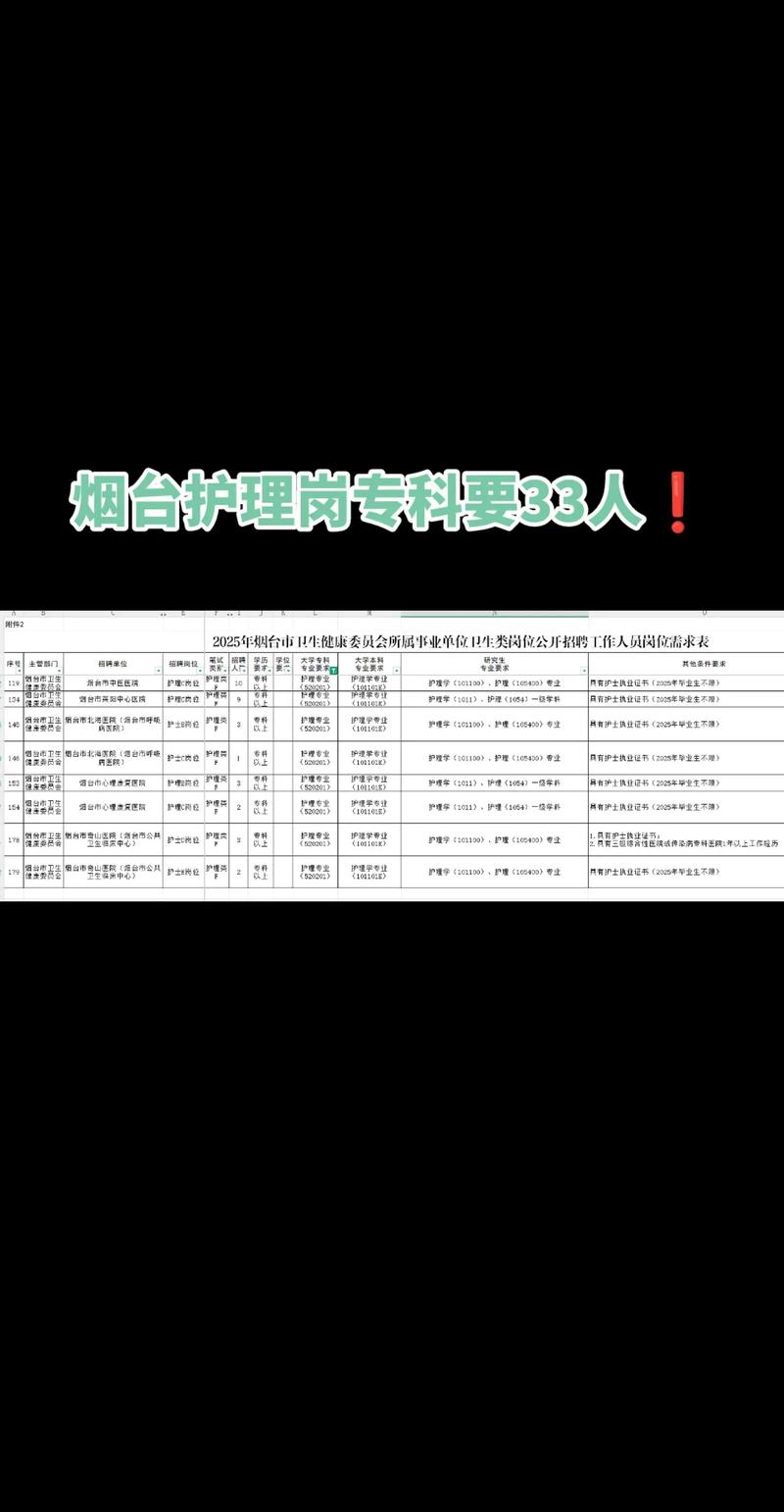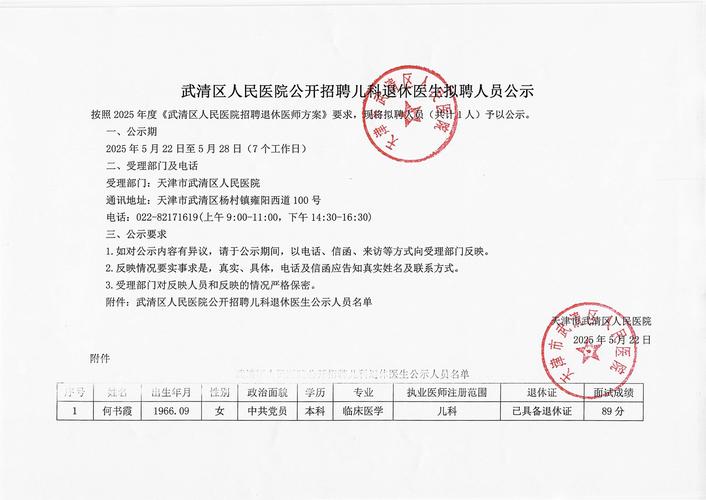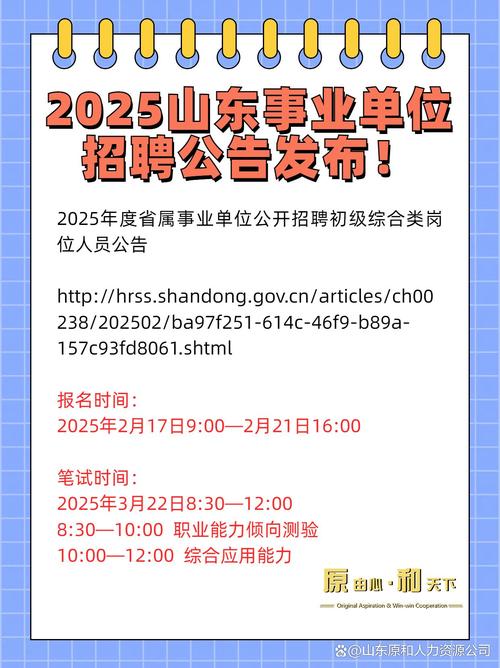2023山东烟台市蓬莱区考选优秀毕业生50人公告
为加大优秀年轻干部储备力度,优化干部人才队伍结构,按照《事业单位人事管理条例》(国务院令第652号)等规定,烟台市蓬莱区拟从大学本科及以上优秀高校毕业生(不含定向培养生、委托培养生)中,分类考选50名事业单位工作人员,进行重点培养。现公告如下:

一、考选类别和数量
(一)A类:15名。

(二)B类:15名。
(三)C类:20名。
二、考选资格条件
(一)具有中华人民共和国国籍且无国(境)外永久居留权。
(二)政治立场坚定,拥护党的组织路线、方针、政策,遵纪守法、品行端正,严格自律,组织协调能力和语言表达能力较强,具有吃苦奉献精神,服从组织安排。
(三)本科生不超过25周岁(1997年2月28日(含)以后出生),硕士研究生不超过28周岁(1994年2月28日(含)以后出生),博士研究生不超过35周岁(1987年2月28日(含)以后出生)。
(四)身心健康,符合考选岗位聘用体检标准。
(五)考选岗位主要参照教育部相关专业学科目录设置专业要求,报考人员学历证书所载专业应与报考岗位专业要求相一致(详见附件1岗位需求表)。报考人员在普通全日制高等学历教育阶段取得国家承认的辅修专业证书、双学位证书的,可与相应的毕业证书配合使用,依据辅修专业证书、双学位证书注明的专业报考。网上报名期间,考选主管机关依据岗位用人需求研究并由考选主管机关认定公布审核通过的专业(含认定的相近专业),以便相同专业人员报考。
(六)A类限我区经济社会发展急需的博士研究生、硕士研究生报考,“双一流”院校可放宽至全日制大学本科毕业生报考。
(七)B类限优秀博士研究生、硕士研究生报考,C类限优秀本科毕业生报考,均需具备下列三个条件之一:
1.在校学习期间入党,入党时间截止到2023年2月28日(含);
2.在大学本科及以上学习期间,截止到2023年2月28日,担任过校(院、系)学生会(研究生会)主席(副主席、秘书长、部长)、团委书记(副书记)、学生党支部书记连续任职满一学年或班级班长、团支部书记连续任职满一学年。
3.在大学本科及以上学习期间,获得省级及以上优秀学生干部、三好学生、优秀毕业生、优秀学生等荣誉称号。
除2023年普通高校应届毕业生以及与国(境)内普通高校应届毕业生同期毕业的留学回国人员的学历、学位及相关证书,须在2023年7月31日前取得外,对暂未取得国(境)外学历学位认证的留学回国人员,可采取“承诺+容缺”方式,允许先行参加考试,在考察或体检阶段提供国(境)外学历学位认证书;其他人员报考的,须在2023年2月28日前取得国家承认的学历、学位及相关证书。已经就业或签订就业协议书的毕业生须具有用人管理权限部门或单位出具同意报考证明,无业人员须提交就业创业证或处于无业状态的个人书面承诺书。
在读的非应届毕业生,现役军人,曾受过刑事处罚或被开除公职的人员,被依法列为失信联合惩戒对象的人员,涉嫌违纪违法正在接受有关机关审查尚未做出结论的人员,在各级各类公务员和事业单位招考(聘)中认定有舞弊等严重违反纪律行为的人员,因个人原因未能在规定时间内转为正式党员或被开除党籍的人员,在校期间受过院系及以上单位处分的人员,以及法律、法规规定不得报考的其他情形人员,不得报考。在读全日制普通高校非应届毕业生不能用已取得的学历学位作为条件报考。
海归留学人员取得国务院学位委员会和教育部授权教育部留学服务中心出具的国(境)外学历学位认证书后,可报考有相应层次学历学位要求的岗位。教育部办公厅《关于统筹全日制和非全日制研究生管理工作的通知》(教研厅〔2016〕2号)和《教育部办公厅等五部门关于进一步做好非全日制研究生就业工作的通知》(教研厅函〔2019〕1号)规定,自2016年12月1日后录取的非全日制研究生,由国家统一下达招生计划,与全日制研究生考试招生执行相同的政策和标准,培养质量坚持同一要求,学历学位证书具有同等法律地位和相同效力,享有平等就业机会。符合上述规定的,报名时与全日制研究生同等对待。
三、报名
(一)报名方式
报名采取统一时间网上报名、网上初审、网上确认的方式进行,每人限报一个岗位。报考人员填写的个人信息和提交的相关材料须真实、准确、有效,如有恶意注册报名信息、扰乱报名秩序或伪造学历证明及其他有关证件骗取考试资格等行为的,查实后取消报名资格。
报名网址:烟台市蓬莱区人民政府网站(www.penglai.gov.cn)
(二)时间安排
报名时间:2023年3月20日8:30—3月24日17:00
初审时间:2023年3月20日8:30—3月25日12:00
确认时间:2023年3月20日8:30—3月28日17:00
(三)具体程序
1.网上报名。报考人员报名前,请仔细阅读本考选简章,确认符合拟报考岗位的条件后再进行网上报名。对报考岗位条件中的专业、学历、资格条件等信息需要咨询时,可拨打咨询电话具体咨询。报考人员登录指定的报名网站,按要求如实、准确填写和提交相关个人信息资料,必须使用有效身份证件,报名与考试时使用的身份证件必须一致。同时上传本人近期1寸免冠正面彩色照片(照片大小114x156像素,占用空间小于20K)、优秀毕业生相关情况证明(可参考附件2,需加盖院系及以上党组织印章,JPG/PNG格式)彩色扫描件,上传的材料应保证清晰可辨。报考信息一经初审通过,不能更改。报名系统于2023年3月24日17:00自动关闭,届时报考人员无法提交(修改)报考信息。
2.网上初审。考选主管机关在规定时间内,根据报考人员网上提交的信息及资料,对报考人员进行资格初审,并在网上反馈初审结果。对因不符合报考条件未通过初审的应说明理由,未按规定填报的应予以说明理由并退回报考人员补充。报考人员在网上提交报考信息后,务必及时查询资格初审结果,按反馈抓紧修改完善报考信息、上传相关证明,如有疑问请主动联系考选主管机关。
3.网上确认。本次考选不收取任何考务费。通过网上初审的考生务于2023年3月20日8:30—28日17:00登录报名网站进行网上确认,逾期未进行网上确认的,视为放弃资格。网上确认成功后,下载打印《烟台市蓬莱区考选优秀毕业生报名登记表》《烟台市蓬莱区考选优秀毕业生诚信承诺书》。
4.其他事宜。报名结束后,最终报名人数如达不到计划招考人数3倍,按照1:3比例相应核减考选计划,A类、B类取消核减的计划全部调整到C类岗位。考选计划取消的岗位,原报考人员可在规定时间内改报其他符合条件的岗位,改报只进行一次。个别急需紧缺专业经烟台市考选主管机关批准,可适当放宽报考比例。
四、资格审查
对报考人员的资格审查工作,贯穿考选工作全过程。网上初审结果不作为确定符合报考条件的最终依据。凡在后续工作中发现初审通过人员不符合考选资格条件或存在弄虚作假等问题的,一经查实,立即取消考选、聘用资格。
进入面试范围人员,本人务于指定时间内按要求进行面试前资格审查(需提交的证明材料详见附件3,资格审查具体事宜请关注烟台市蓬莱区人民政府网站)。
报考人员未在规定时间内提交有关证明材料或证明材料不全的,视为弃权。经审查不具备报考条件的,取消考试资格。如发生面试前资格审查与网上初审结果不一致现象,以面试前资格审查结果为准。
五、考试
此次考选优秀毕业生,系我区镇街急需紧缺高层次人才,直接进行面试,成绩采用百分制计算,保留到小数点后两位数,尾数四舍五入。
1.初试。如通过资格审查人数超过计划招考人数5倍的,经考选主管机关同意可增加初试环节,也可直接面试。初试方式为面谈,按照各岗位考选计划1:3的比例,依据面谈成绩由高分到低分确定进入面试人选。初试成绩不带入面试(初试具体事宜请关注烟台市蓬莱区人民政府网站)。
2.面试。面试采取结构化形式,主要测试报考人员的组织计划、综合分析、沟通协调、临场应变、语言表达等基本素质和能力。面试成绩于本场面试全部结束后公布。为保证人员素质,面试成绩合格线为70分,不足70分的不予聘用。考生免缴面试考务费,来蓬参加面试期间,考选主管机关负责统一免费安排住宿(面试具体事宜请关注烟台市蓬莱区人民政府网站)。
面试结束后,面试成绩即为考试总成绩。根据考试总成绩,分岗位由高分到低分按考选计划1:1.2的比例确定进入考察体检范围人员名单。如同一岗位中出现报考人员考试总成绩相同且影响聘用的,则依次按照博士、“双一流”院校、中共党员、省级以上荣誉、学生干部排序确定进入考察体检范围人员。
六、考察与体检
进入考察体检范围人员确定后,分岗位按计划招考人数由高分到低分依次等额对报考人员进行考察、体检。
考选主管机关将通过一定形式,按照德才兼备的标准,根据考选岗位的要求,全面了解被考察对象的各方面情况,同时对被考察对象进行资格复审。被考察对象在考选期间的表现,将作为考察的重要内容之一。
如经考察不合格或发现在考选过程中有弄虚作假等违反规定的行为,取消聘用资格。被考察对象在考察过程中提供虚假材料、隐瞒事实真相或者有其他妨碍考察工作的行为,干扰、影响考选主管机关客观公正做出考察结论的,不予聘用;情节严重、影响恶劣的,将其违纪违规行为记入诚信档案库,记录期限为五年。根据山东省委组织部《关于进一步从严管理干部档案的意见》(鲁组发〔2017〕2号)规定,考选主管机关将严格审核把关被考察对象档案,认真调查档案中存在的问题,问题未查清、未处理到位的,不得办理聘用手续。
体检应在县级以上综合性医院进行,体检标准和项目参照公务员录用体检标准及操作手册执行。报考人员免缴体检、复检费用。所有的体检项目检查完毕后,主检医师认为要做进一步检查方能做出判断的,报考人员要服从主检医师安排,做进一步检查。报考人员对体检结果(当日当场复检项目除外)有异议的,可在收到体检结论7日内,向考选主管机关提出书面申请,由考选主管机关组织复检,复检不在原体检医院进行,复检项目由复检医疗机构确定,体检结果以复检结论为准,复检只能进行一次。必要时,考选主管机关可以要求重新体检。报考人员没有征得考选主管机关同意,不在规定时间参加体检或复检,视为弃权。报考人员不服从主检医师体检安排或在体检过程中弄虚作假或隐瞒影响聘用的疾病、病史的,不予聘用。有请他人顶替体检以及交换、替换化验样本等严重违纪违规行为的,不予聘用,并将其违纪违规行为记入诚信档案库,记录期限为五年。
考察、体检不合格的,取消其聘用资格。
七、聘用
经考察、体检合格的人员,在烟台市蓬莱区人民政府网站公示,公示期为7个工作日。公示期满没有问题或反映问题不影响聘用的,按照规定办理聘用手续(应届毕业生先签订就业协议书,正式毕业后再按规定办理聘用手续)。公示期有反映问题影响聘用并查实的,取消其聘用资格;公示期有反映问题,但一时难以查实的,暂缓聘用,待查实并作出结论后再决定是否聘用。拟聘用人员名单公示后原则上不再递补。国家有明确文件规定,有关事业单位急需补充工作人员的,经市事业单位人员综合管理部门同意,公示后可以从进入同一岗位考察体检范围的人员中依次递补。
聘用人员由组织部门统一分配,进行精准化、差异化、递进式培养锻炼。组织部门将建立“优选计划”跟踪管理制度,根据优秀毕业生现实表现、专业特长和工作需要,或安排到重点工程指挥部、经济园区、重点产业部门等进行重点培养锻炼,或适当调整工作岗位。
拟聘用人员不服从统一分配的、未如期取得学历学位证书、无正当理由未在规定时间内报到的,取消聘用资格。聘用人员按规定实行试用期制度。试用期间与用人单位签订聘用合同,最低服务年限为5年(含试用期),聘用合同一经签订,双方应严格履行。试用期满,按规定进行考核,经考核合格的,按规定办理相关手续;考核不合格的,解除聘用合同。
八、待遇政策
考选的优秀毕业生,作为党政领导干部储备人才和优秀年轻干部重要来源。其中,首次新引进到烟台市事业单位工作且缴纳社保一年以上的博士研究生、硕士研究生、“双一流”和全球TOP200(QS)高校本科生、普通高校本科生,每人每年分别发放3.6万元、2.4万元、1.2万元、6000元生活补贴,补贴3年;在烟新购商品住房的,分别发放20万元、10万元、5万元、2万元一次性购房补贴,购买首套商品住房的,研究生均可申请最高额度80万元的住房公积金贷款;博士研究生发放“仙境惠才卡”,硕士研究生发放“仙境惠青卡”,按政策享受各项服务和待遇。同时,根据个人表现和职位空缺情况,优先选聘博士研究生担任各园区、重点产业部门科技副职。博士配偶愿意一同来蓬工作的,组织人社部门根据原工作单位性质和身份予以安置。没有工作的,优先推荐就业。博士子女在义务教育节点适龄升学,可根据本人意愿在全区范围内公办义务教育阶段学校(含公办幼儿园)就读。
九、疫情防控
在公开招聘组织实施过程中,按照防控新型冠状病毒感染有关要求,落实相关措施,必要时对有关工作安排进行适当调整,相关信息将及时在烟台市蓬莱区人民政府网站发布。
十、其他
报考人员应仔细阅读本考选简章及附件,及时了解烟台市蓬莱区人民政府网站发布的最新信息,保持通讯畅通有效,因本人原因错过重要信息而影响考选的,责任自负。报考人员要严格按照国家、省、市政策文件和本考选简章规定执行,如发现违纪违规行为,按照《事业单位公开招聘违纪违规行为处理规定》有关规定处理。
本次考选不指定考试教材和辅导用书,不举办也不授权或委托任何机构举办考试辅导培训班。
本简章由中共烟台市蓬莱区委组织部、烟台市蓬莱区人力资源和社会保障局负责解释。
咨询电话:0535-5643520,0535-5668123
监督电话:0535-5815315
报名(考选通知、信息公告公示)网站:烟台市蓬莱区人民政府网站(www.penglai.gov.cn)
点击查看>>>
1:2023年蓬莱区考选优秀毕业生岗位需求表
2:2023年蓬莱区考选优秀毕业生相关情况证明(式样)
3:2023年蓬莱区考选优秀毕业生资格审查材料清单
4:2023年蓬莱区考选优秀毕业生同意报考档案存放证明(式样)
中共烟台市蓬莱区委组织部
烟台市蓬莱区人力资源和社会保障局
2023年2月28日
原标题:2023年烟台市蓬莱区考选优秀毕业生简章
ZBLOG版权声明:以上内容作者已申请原创保护,未经允许不得转载,侵权必究!授权事宜、对本内容有异议或投诉,敬请联系网站管理员,我们将尽快回复您,谢谢合作!
 烟台招聘求职首选平台_最新岗位信息_人才市场动态
烟台招聘求职首选平台_最新岗位信息_人才市场动态

